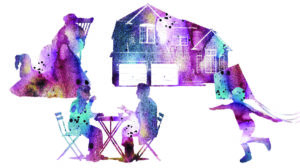Woman of Greatness


What were the Ishah HaShunamis’s rare strengths?
Ishah HaShunamis
Very few people are described as “great” in Tanach. Among the exceptions is the woman from Shunem who is called a “great woman.” What was the source of the Ishah HaShunamis’s greatness? How did this greatness manifest? What lessons can we learn from her for our lives?
Greatness Defined
Rashi in the beginning of parshas Va’eschanan defines the middah of Hashem’s greatness as the attribute of goodness and kindness. This is the exact quality we see demonstrated by this woman in the Navi. In Melachim II chapter 4 the Navi describes how Elisha frequently passed through Shunem on his travels. This woman would continually welcome the navi into her home for meals. Eventually she even prepared a separate room in her home for Elisha’s personal comfort every time he visited this city.
It’s clear from the Navi that this renovation was her own initiative — she did so to fashion her home into a “beis vaad lachachamim — a meeting place for scholars.” Indeed the mefarshim point out the acronym of the items placed in the room — mitah shulchan kisei and ner (bed table chair lamp) spell out the word mishkan; this was a room where Elisha could meditate and connect with Hashem.
The mishnah in Avos enjoins all of us to create homes where scholars and Torah classes are part of the fabric of our homes — to create a family culture in which children are raised to view the home as a meeting place for sages. There’s a Talmudic statement that one “who is careful with lighting the candles will merit children who are Torah scholars.” What does this mean? Being careful with candles Rav Chaim Ephraim Zaitchik explains refers to a father who although tired from a long week stays up late on Friday night to learn by the candles’ light.
Imagine a young child who wakes up thirsty and pads out of bed to the kitchen. On the way he sees his father learning in the dining room softly chanting the words of the Gemara. An image that will be imprinted on this child’s memory and that will stay with him for all his life. When he grows up this will be his normal and he’ll naturally want to emulate his father in his own life.
But making our homes a beis vaad lachachamim doesn’t depend on a husband’s learning. There are so many ways for a woman to cultivate this tone and atmosphere. Hosting shiurim parlor meetings for tzedakah ushering in rabbanim who come collecting and offering refreshments — all these are simple ways in which our children see both our mesirus nefesh and love for Torah.
Community Connection
An alternate way of understanding greatness is the Talmud’s equation of greatness with humility: In all places that we find Hashem’s greatness mentioned there we find His humility. The quality of humility is clearly possessed by the Ishah HaShunamis.
Elisha asked what he could do to repay her kindness even offering to daven on her behalf on Rosh Hashanah. She declined and her answer has become a phrase that encapsulates the Jewish attitude to community: “Besoch ami anochi yoshaves — I dwell among my people.” This great woman wanted to be judged in the context of the rest of the nation. Rav Chaim Friedlander in Sifsei Chaim notes that one who connects himself to the community demonstrates humility and is therefore deserving of the special rachamim Hashem sends down.
The quality of humility is woven into the very text of our prayers. Heal us bless us restore us we ask each time beseeching not only for ourselves but for the nation in its entirety. Indeed Rav Chaim Shmuelevitz (Sichos Mussar) learns from here the importance of davening in the plural even for individual requests so as to link ourselves with the special brachos the community is granted.
We might think that the community is more a man’s thing — women serve Hashem from the privacy of their homes. But even when we’re unable to join communal events or join the kehillah in saying Tehillim for example we can still express our connection by saying some Tehillim at home at the same time as the communal gathering.
On another level we can work to engender a community spirit. When our kids come home and talk about a new child in the class we can encourage them to be warm and friendly. When kids disparage others we should discourage feelings of superiority and model to them how to look for and appreciate others’ strengths.
Upward Journey
A third aspect of this woman’s greatness is found in the next part of the account. Elisha promises the woman that she’ll have a child. Indeed after being barren for many years she’s granted a son. When he’s a young boy he goes out to help his father in the fields and complains of a headache. The child is brought home to his mother and a few hours later the boy dies.
The woman tells her husband that she is going to run over to see the navi. Her husband asks her why she is going today since it was not Shabbos or Rosh Chodesh. This is one of the main sources from which we learn the custom to visit one’s rav on a Yom Tov. The Rav Yaakov Kamenetsky in Emes L’Yaakov notes that she would go to visit the navi to strengthen her emunah and heighten her yiras Shamayim. This was similar he notes to people going on aliyah l’regel. Staying in close proximity to the Beis Hamikdash and bringing korbanos infused the nation with spirituality.
The world may be a very different place from when a young boy followed his father to work in the fields and prophecy was widespread but some things don’t change. The need to constantly strengthen our emunah and connection to Hashem continues through the centuries. A mark of a great person is one who’s constantly growing and strengthening himself particularly in emunah. Rav Chatzkel Levinstein is quoted as saying that a day in which he didn’t work on strengthening his emunah was not really considered a day in his life. Particularly in our generation when the mitzvah of our dor is emunah we need to learn on a constant basis and work on acquiring higher and higher levels of emunah.
Life-Altering Words
The fourth aspect of this woman’s greatness is reflected in the high level of emunah that she acquired. The Ishah HaShunamis answers her husband’s question with one word: “Shalom.” She does not tell him that the boy has died — nor does she tell Elisha. She merely hints to the navi that he promised her a child and let her not be disappointed. From her veiled words Elisha deduces that the child died.
Alshich Hakadosh notes that there is a covenant connected with our speech; our speech creates a reality. While the woman did not articulate that her son had died it was not yet a final reality. In going to the navi she showed that she believed that the navi could revive the child. This woman’s emunah was so profound that nothing was impossible. And so her son was brought back to life.
In our own lives how careful we need to be in the expressions we use and how carefully we need to train our children to be aware of the power of their speech. Speech creates a reality. An awesome responsibility — and an incredible privilege.
Just who was this son born from a blessing revived through a miracle? The midrash notes that the son of the Ishah HaShunamis was Chavakuk Hanavi. The midrash on Eishes Chayil relates that the pasuk referring to the children and husband praising their mother and wife is a reference to the Ishah HaShunamis.
Famously Chavakuk Hanavi distilled all the mitzvos into one primary obligation: emunah. The greatest praise indeed about this woman is her incredible emunah and she gained this by creating a sanctuary for the navi in her home and humbling herself before Hashem. What is stopping each of us from following her path to greatness?
(Originally featured in Mishpacha Issue 654)
Oops! We could not locate your form.













